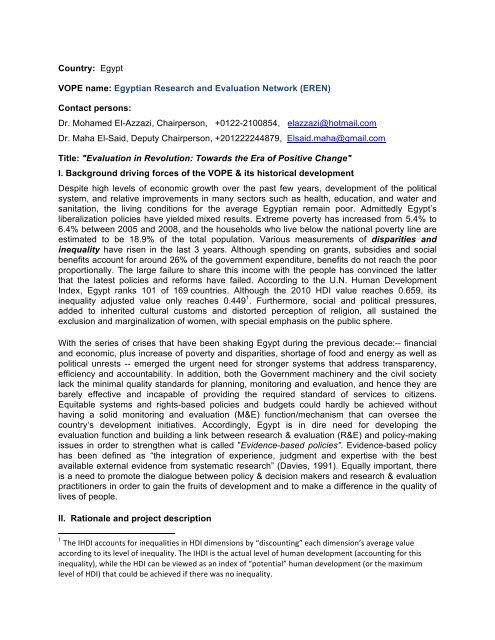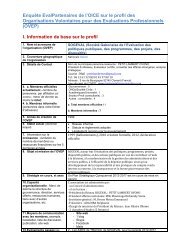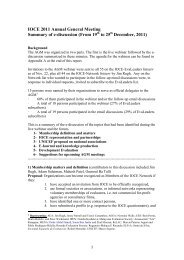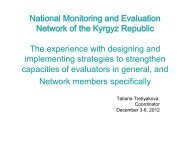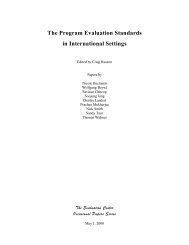Egyptian Research and Evaluation Network (EREN) - IOCE
Egyptian Research and Evaluation Network (EREN) - IOCE
Egyptian Research and Evaluation Network (EREN) - IOCE
- No tags were found...
You also want an ePaper? Increase the reach of your titles
YUMPU automatically turns print PDFs into web optimized ePapers that Google loves.
Country: EgyptVOPE name: <strong>Egyptian</strong> <strong>Research</strong> <strong>and</strong> <strong>Evaluation</strong> <strong>Network</strong> (<strong>EREN</strong>)Contact persons:Dr. Mohamed El-Azzazi, Chairperson, +0122-2100854, elazzazi@hotmail.comDr. Maha El-Said, Deputy Chairperson, +201222244879, Elsaid.maha@gmail.comTitle: "<strong>Evaluation</strong> in Revolution: Towards the Era of Positive Change"I. Background driving forces of the VOPE & its historical developmentDespite high levels of economic growth over the past few years, development of the politicalsystem, <strong>and</strong> relative improvements in many sectors such as health, education, <strong>and</strong> water <strong>and</strong>sanitation, the living conditions for the average <strong>Egyptian</strong> remain poor. Admittedly Egypt’sliberalization policies have yielded mixed results. Extreme poverty has increased from 5.4% to6.4% between 2005 <strong>and</strong> 2008, <strong>and</strong> the households who live below the national poverty line areestimated to be 18.9% of the total population. Various measurements of disparities <strong>and</strong>inequality have risen in the last 3 years. Although spending on grants, subsidies <strong>and</strong> socialbenefits account for around 26% of the government expenditure, benefits do not reach the poorproportionally. The large failure to share this income with the people has convinced the latterthat the latest policies <strong>and</strong> reforms have failed. According to the U.N. Human DevelopmentIndex, Egypt ranks 101 of 169 countries. Although the 2010 HDI value reaches 0.659, itsinequality adjusted value only reaches 0.449 1 . Furthermore, social <strong>and</strong> political pressures,added to inherited cultural customs <strong>and</strong> distorted perception of religion, all sustained theexclusion <strong>and</strong> marginalization of women, with special emphasis on the public sphere.With the series of crises that have been shaking Egypt during the previous decade:-- financial<strong>and</strong> economic, plus increase of poverty <strong>and</strong> disparities, shortage of food <strong>and</strong> energy as well aspolitical unrests -- emerged the urgent need for stronger systems that address transparency,efficiency <strong>and</strong> accountability. In addition, both the Government machinery <strong>and</strong> the civil societylack the minimal quality st<strong>and</strong>ards for planning, monitoring <strong>and</strong> evaluation, <strong>and</strong> hence they arebarely effective <strong>and</strong> incapable of providing the required st<strong>and</strong>ard of services to citizens.Equitable systems <strong>and</strong> rights-based policies <strong>and</strong> budgets could hardly be achieved withouthaving a solid monitoring <strong>and</strong> evaluation (M&E) function/mechanism that can oversee thecountry‘s development initiatives. Accordingly, Egypt is in dire need for developing theevaluation function <strong>and</strong> building a link between research & evaluation (R&E) <strong>and</strong> policy-makingissues in order to strengthen what is called ”Evidence-based policies”. Evidence-based policyhas been defined as “the integration of experience, judgment <strong>and</strong> expertise with the bestavailable external evidence from systematic research” (Davies, 1991). Equally important, thereis a need to promote the dialogue between policy & decision makers <strong>and</strong> research & evaluationpractitioners in order to gain the fruits of development <strong>and</strong> to make a difference in the quality oflives of people.II. Rationale <strong>and</strong> project description1 The IHDI accounts for inequalities in HDI dimensions by “discounting” each dimension’s average value according to its level of inequality. The IHDI is the actual level of human development (accounting for this inequality), while the HDI can be viewed as an index of “potential” human development (or the maximum level of HDI) that could be achieved if there was no inequality.
With reference to the historical development background of in the case of Egypt presentedabove, the following were the key challenges to the process of evaluation in Egypt. Thesechallenges constitute the driving forces of the <strong>Research</strong> & <strong>Evaluation</strong> <strong>Network</strong> in Egypt. Theycould be summarized as follows: Most of the development programs in Egypt are becoming more <strong>and</strong> more questionablein terms of effectiveness, relevance, impact <strong>and</strong> sustainability. Lack of accessibility to evidence-based knowledge because of the weak institutional<strong>and</strong> human resource capacities especially, in the governmental institutions in Egypt. Mechanisms of transparency & accountability of the research & evaluation informationare not activated adequately. Weak coordination <strong>and</strong> partnerships amongst the different stakeholders result inlimited exchange of experiences <strong>and</strong> dissemination of R&E findings. Number of professional researchers & evaluators are limited, <strong>and</strong> the capacities of themid-level ones are not strong enough to provide quality evaluation processes.The network primarily started informally amongst a group of 13 development practitioners, freelanceconsultants, Government officials <strong>and</strong> people concerned with lack of effectiveness ofdevelopment initiatives in Egypt. All were, <strong>and</strong> are still, working in the development field indifferent international <strong>and</strong> national organizations, <strong>and</strong> witnessed the weakness of results, thelack of guidelines <strong>and</strong> st<strong>and</strong>ards, the limited accountability with special emphasis onprofessional ethics, the limited capacities <strong>and</strong> the frail accountability particularly in the area ofresearch <strong>and</strong> evaluation.In December 2008 a group of national experts, University professors, development practitionersas well as Government partners, in collaboration with UNICEF/ ECO held a symposium called"<strong>Research</strong> <strong>and</strong> <strong>Evaluation</strong> in Egypt: Towards Evidence-Based Policies" to discuss thechallenges facing the evaluation of development interventions in Egypt. That definitely has animpact on the effectiveness <strong>and</strong> the impact of the development results as well as on the policymakingprocess. The symposium ended up with the formation of a constitution of an informalevaluation network that seeks to enhance collaboration amongst researchers <strong>and</strong> practitionersin development, to promote cross-disciplinary debate <strong>and</strong> capacity development opportunitieson research <strong>and</strong> evaluation, to enhance the generation <strong>and</strong> the dissemination of knowledge,<strong>and</strong> to enhance the quality of research <strong>and</strong> evaluation in Egypt. The network is currently beingregistered, under the <strong>Egyptian</strong> law, as a formal evaluation association that is founded by 13members <strong>and</strong> governed by seven members serving as the board of directors, to be rotated onbi-annual basis. The total numbers of members, to date, are 151.III. Strategy <strong>and</strong> implementationAdvocacy for Evidence-based Policies: bridging the gap between policy makers <strong>and</strong>researchers/ evaluatorsSince its start <strong>EREN</strong> was keen to contribute to creating the enabling environment toprofessionalize the function of evaluation <strong>and</strong> to utilize it for improving programming as wellas for providing evidence for equitable decision-making. At the 2008 Symposium, a key
<strong>EREN</strong> member prepared a policy paper that explores the situation of evaluation in Egypt<strong>and</strong> analyzed the challenges of evaluating the development interventions in the <strong>Egyptian</strong>context. This paper was presented in the presence of participants who were representingnational <strong>and</strong> international decision <strong>and</strong> policy makers. There it was frequently emphasizedthe urgent need to advocate for paradigmatic shift in the thought <strong>and</strong> practice of evaluationin Egypt <strong>and</strong> the importance to link it to policy-making <strong>and</strong> to programmatic excellence.<strong>EREN</strong> was keen to primarily partner with the Centre for Project <strong>Evaluation</strong> <strong>and</strong> MacroEconomic Analysis (PEMA) under the Ministry of International Cooperation (MoIC), to havethe network formally established. Due to the instability in the period after the <strong>Egyptian</strong>Revolution, partnership with the Ministry was weakened. However, MoIC is expected toauspice the upcoming national conference that <strong>EREN</strong> plans to conduct by the end of 2012on "Country-Led M&E to Enhance Efficiency <strong>and</strong> Accountability". This ministry is animportant national partner, since it is responsible for planning as well as for monitoring <strong>and</strong>evaluating aid effectiveness in Egypt. In addition, an expected partner in this conference isthe Ministry of State Administrative Development that is m<strong>and</strong>ated to monitor <strong>and</strong> improvethe performance of the Public Sector in Egypt. In addition, it includes the "Transparency <strong>and</strong>Integrity Committee" whose mission is to enhance transparency <strong>and</strong> integrity efforts.Finally, in order to contribute to the generation <strong>and</strong> dissemination of evaluation materials inEgypt, where a good part of the national partners are only Arabic speakers, <strong>EREN</strong>constituted an "Arabization <strong>and</strong> Publication" initiative. The latter is responsible for Arabizing/translating evaluation policies, st<strong>and</strong>ards <strong>and</strong> materials from English to Arabic language.This would definitely help to fulfill the dem<strong>and</strong> to market for the use of evaluation.M&E Capacity development: to enhance ownership, harmonization & sustainabilityCapacity development, in the evaluation field specifically, is seen as part of the broadereffort to improve public policy-making to achieve development goals. Consensus on theDAC <strong>Network</strong> is that partner evaluation capacity plays a key role in enabling ownership ofdevelopment evaluation <strong>and</strong> ensuring mutual accountability for development results, <strong>and</strong> isa decisive factor in improving alignment with partner evaluation systems. To enhancecapacities of national partners in the area of evaluation, <strong>EREN</strong> instigated multiple initiativeswith diverse development players including government officials, researchers <strong>and</strong>evaluators, <strong>and</strong> media people.<strong>EREN</strong>’s strategy to enhance capacities of national partners involves targeting diverseaudiences: senior evaluators, mid-level professionals, Government partners, media people,young people as well as other civil society partners like NGOs. The purpose of capacitybuilding is perceived as investing on results achieved through capacity building. Seniorevaluators were targeted in more than one session in 2010, while inviting well knownnational <strong>and</strong> international consultants to speak about "Governance <strong>and</strong> evaluation", "Impact<strong>Evaluation</strong>", "Evaluating Budgets" as well as "Advocacy <strong>and</strong> <strong>Evaluation</strong>". Most of <strong>EREN</strong>initiatives target mid-level professionals by conducting research <strong>and</strong> evaluation seminars,
institutionalizing diploma on R&E, <strong>and</strong> conducing open seminars for discussion arounddifferent evaluation issues.Media people were significantly targeted by ERNE, where a "Media Watch Group" wasconstituted <strong>and</strong> a number of three workshops were conducted for media people from morethan 16 media institution/channels. It started in 2010, in collaboration with PLANInternational <strong>and</strong> the Faculty of Communication in Cairo University, to conduct a seminar on"Enhancing Role of Media People in Utilizing <strong>Research</strong> <strong>and</strong> Disseminating Knowledge",where 43 media people <strong>and</strong> researchers participated <strong>and</strong> documented their training needsto build channels of communication between media <strong>and</strong> research. In 2011 <strong>and</strong> 2012, twomedia seminars were conducted on "Development Aspects in Media Coverage" <strong>and</strong> on"Extending Partnership between Media People <strong>and</strong> <strong>Research</strong>ers". A new partnership wasinitiated between the Press Syndicate <strong>and</strong> <strong>EREN</strong> <strong>and</strong> that is aimed to flourish in 2012-2013to strengthen the media watch group that can monitor the media performance <strong>and</strong> coverageof the development issues.Finally, an emerging initiative has developed to enhance capacities of junior researchers<strong>and</strong> evaluators in planning, designing <strong>and</strong> conducting research <strong>and</strong> evaluation <strong>and</strong> toencourage students to play a more pro-active role in monitoring <strong>and</strong> evaluating theircommunities. (Details on capacity building events are mentioned in section VII on 'Progress<strong>and</strong> Results'.)Towards Developing Equity-Focused <strong>and</strong> Gender-Sensitive <strong>Evaluation</strong>Although one of the 'raisons d'être' of <strong>EREN</strong> is its passion <strong>and</strong> belief in issues of equitybaseddevelopment, community-based M&E as well as empowerment <strong>and</strong> transformation,its achievement in this area limited. In 2010 a session was conducted on "Gender <strong>and</strong><strong>Evaluation</strong>" that targeted senior <strong>and</strong> mid-level researchers <strong>and</strong> evaluators. Gender isintegrated in one of the Diploma Curriculum "Modern Trends in Development" that presentsconcepts like gender; Results-Based Management <strong>and</strong> Human Rights-Based Approach asmodern trends in development. Last but not least, a promising collaboration with UN Womenis emerging, where the latter expressed interest in adding one separate course on "Genderbased<strong>Evaluation</strong>" in addition to its support in Arabizing manual on "Gender Sensitization of<strong>Evaluation</strong>".VI. Key challenges/bottlenecks that hampered <strong>EREN</strong>'s capacity to contribute to the abovestrategyThere is a long way to go in order to substantially achieve a tangible progress in "CountryledM&E", due to the complex challenges the national institutions have in their structures,<strong>and</strong> the hard <strong>and</strong> disjointed management of the Government machinery would not make thechange easy <strong>and</strong> fast.The culture of generating, utilizing <strong>and</strong> exchanging information is weak. A culture ofprotectionism amongst people working in, or concerned with, research <strong>and</strong> evaluation couldeasily lead to risk of stagnation of the sector of research <strong>and</strong> evaluation in Egypt.
There is also a lack of volunteer work <strong>and</strong> collective responsibility. <strong>Research</strong> <strong>and</strong> evaluationconsultants’ time is valuable, where they are committed with different tasks <strong>and</strong>assignments, added to the fact that their time is worth resources.Belated official registration of <strong>EREN</strong>, especially with the multiple turnovers of the Minister<strong>and</strong> key officials in the Ministry m<strong>and</strong>ated to approve the network as an official evaluationassociation, has been another bottleneck.VII. Progress <strong>and</strong> resultsFirst: Developing Capacities of National Partners1. Two-week Seminar on “Designing <strong>Evaluation</strong>/<strong>Research</strong>”:In collaboration with the Health <strong>and</strong> Environment Education Association <strong>and</strong> the NationalPlanning Institute, <strong>EREN</strong> conducted these seminars for 57 government officials, mid-levelprofessionals <strong>and</strong> junior university professors involved in planning <strong>and</strong> implementingevaluation. The purpose was to provide participants with basic underst<strong>and</strong>ing of thediscipline <strong>and</strong> profession of evaluation <strong>and</strong> to develop the knowledge <strong>and</strong> capacities indesigning an evaluation research with a sound methodology.2. One-year Professional Diploma on <strong>Research</strong> <strong>and</strong> <strong>Evaluation</strong>:<strong>EREN</strong>, in collaboration with UNICEF/ECO <strong>and</strong> the Dutch <strong>and</strong> in collaboration with two<strong>Egyptian</strong> universities (Assuit <strong>and</strong> Helwan Universities), adopted an initiative toinstitutionalize a professional diploma in research <strong>and</strong> evaluation. This diploma targetsdevelopment officers specialised in monitoring <strong>and</strong> evaluation, government officials workingin relevant fields, mid-level researchers, <strong>and</strong> individual emerging evaluators. The diploma isfollowing the credit-hour system amounting to a total of 24 credit hours along a period of oneyear.3. Enhancing the Role of <strong>Evaluation</strong> in Improving Governance Practices:In an attempt to demonstrate the intrinsic link between evaluation <strong>and</strong> governance <strong>and</strong> touse evaluation as one of the tools to strengthen governance practices in Egypt, <strong>EREN</strong>conducted a seminar for 66 researchers, evaluators <strong>and</strong> senior professionals on “Enhancingthe Role of <strong>Evaluation</strong> in Improving Governance Practices”. Although EANRE conducted theabove mentioned workshop only one time, it is aiming to continue a series of “<strong>Evaluation</strong><strong>and</strong> Governance” workshops, especially after the <strong>Egyptian</strong> revolution, where the culture oftransparency, integrity <strong>and</strong> accountability are widely welcomed by <strong>Egyptian</strong>s at the differentlevels.4. Initiating Child-Youth Led <strong>Research</strong> <strong>and</strong> <strong>Evaluation</strong>:In collaboration with NCCM, <strong>EREN</strong> piloted an initiative to enhance capacities of 38 juniorresearchers <strong>and</strong> evaluators divided into two age categories (14-17) <strong>and</strong> (18-24). Thepurpose was to disseminate <strong>and</strong> strengthen the culture of evaluation in schools <strong>and</strong>Universities, while enhancing the capacities to plan, design <strong>and</strong> conduct R&E. Six pieces ofresearch plans were developed <strong>and</strong> implemented by students in their schools <strong>and</strong>
Universities to come out with final reports that were presented in a public event organized byNCCM.Second: Knowledge Dissemination to Proliferate Culture <strong>and</strong> Practice of <strong>Evaluation</strong>1. Role of Media in Dissemination of <strong>Research</strong> Results <strong>and</strong> in KnowledgeManagement<strong>EREN</strong> started the process of developing the capacities of media people, journalists, <strong>and</strong>communication specialists in Egypt. Training workshops are meant to be a mediumconducive to building relations between researchers <strong>and</strong> evaluators <strong>and</strong> between mediapeople, <strong>and</strong> to get the latter committed to get engaged to development issues. Twoworkshops were held with Journalists’ Syndicate <strong>and</strong> with Faculty of Communication inCairo University.2. Translation <strong>and</strong> Publishing Project to Avail <strong>and</strong> Disseminate <strong>Evaluation</strong>Resources in Arabic<strong>Evaluation</strong> materials hardly exist in the Arabic language, <strong>and</strong> therefore most, if not allnational partners do not have their chance to build their knowledge or to enhance theirskills in evaluation. <strong>EREN</strong> has established an initiative to translate key materials <strong>and</strong> keynational research in the country from English to Arabic to avail resources in nationallanguage, to help accentuate the culture of evaluation, <strong>and</strong> to activate dialogue amongstpartners on evaluation issues. To date, three key evaluation books were translated,added to UNEG quality st<strong>and</strong>ards for ToRs <strong>and</strong> reports, <strong>and</strong> short articles/ papers onutilization-focused evaluation, national capacity building, etc.3. Professional Development Seminars:Professional development seminars are conducted to exchange information on recentissues in research <strong>and</strong> evaluation <strong>and</strong> are mainly targeting mid <strong>and</strong> senior levelprofessionals. Three seminars were conducted on "Outcome Mapping", "Country-ledM&E" <strong>and</strong> on "Community-based Monitoring".4. Website for <strong>EREN</strong> (Under Construction)<strong>EREN</strong> is developing a website that is expected to be launched soon.Third: Bridging Theory <strong>and</strong> Practice: Towards Evidence-based PoliciesNational Conference on “Country-Led M&E to Enhance Transparency <strong>and</strong>Efficiency”<strong>EREN</strong> is partnering with UNICEF, IDRC <strong>and</strong> other international <strong>and</strong> national partners toconduct a national conference on “Country-Led M&E to Enhance Transparency <strong>and</strong>Efficiency”. The conference is meant to be the first of its kind to engage policy makers,key officials, <strong>and</strong> the public towards the significant need to establish M&E systems in the
Government, to improve information management systems <strong>and</strong> to encourage R&E tosupport the evidence based decision makingVIII. Key enabling factors for <strong>EREN</strong> to Achieve Expected Results1. Despite the complex instability Egypt is passing through, the revolution has led to a generalatmosphere of openness <strong>and</strong> quest for transparency, integrity <strong>and</strong> accountability. There isbigger dem<strong>and</strong> for collective responsibility <strong>and</strong> public action.2. Due to the decline in aid effectiveness <strong>and</strong> the reduction of international aid at the sametime, disparities are prevailing, creating an imbalance in the supply-dem<strong>and</strong> flow, <strong>and</strong> henceorganizations have started to explore <strong>and</strong> reread the situation aiming to adjust strategies toimprove results.UNICEF’s belief to the significance of the evaluation function <strong>and</strong> its support to establish<strong>and</strong> strengthen national evaluation boosted lots of initiatives <strong>and</strong> constantly providedrequired technical <strong>and</strong> financial assistance to make the network happen.IX. Innovations <strong>and</strong> lessons learnedInnovation: For the first time in the Arab World, a professional diploma on <strong>Research</strong> <strong>and</strong><strong>Evaluation</strong> is drafted in Arabic language (9 curricula for professors <strong>and</strong> for teachers) to coverthe basic level of evaluation <strong>and</strong> development. These include project management, researchmethodology <strong>and</strong> research ethics, evaluation of development programmes, public policyanalysis, statistical analysis <strong>and</strong> statistical computer packages, modern trends in development,knowledge management, <strong>and</strong> intellectual capital development, social planning, skillsdevelopment added to applied research (project).Lessons Learnt:• It is good to start from bottom-up <strong>and</strong> to gain constituency; however having the support ofthe political <strong>and</strong> administrative leadership is vital <strong>and</strong> significant to establish the networkfaster.• Adopt the policy/ advocacy strategy as one of the main strategies an evaluation networkshould be concerned about.• Exp<strong>and</strong> the membership to include different key players <strong>and</strong> influential members from thebeginning, as this would boost the energy, enhance confidence in the network <strong>and</strong> help towork on policy level.• Seek to implement joint programmes <strong>and</strong> initiatives, as this would help in investing on efforts<strong>and</strong> on resources.• Choose the agents of change <strong>and</strong> make them your façade of promoting the network <strong>and</strong>defending it whenever needed.• Build a good linkage between knowledge management <strong>and</strong> between research <strong>and</strong>evaluation.• Last but not least, work intensively to attract the private sector <strong>and</strong> the media as both caneasily support the whole initiative whether in generating resources <strong>and</strong> collective
esponsibility (PS) or in utilizing evidence <strong>and</strong> evaluation results in evaluation <strong>and</strong> especiallyin media channels.X. Next steps• Conference on "Country-Led M&E" in Egypt – December 2012• Formative evaluation of Diploma on <strong>Research</strong> <strong>and</strong> <strong>Evaluation</strong>. August 2012.• Completion of Arabization of one book on evaluation: "Most Significant Change" <strong>and</strong> of"From Policies to Results". September 2012.• 10 day series of seminars on good field work for a quality research <strong>and</strong> evaluation. Augustthrough October 2012• Mini-IPDET to be conducted with IDRC <strong>and</strong> regional partners in Egypt. January 2013. Thisincludes the Translation of the “Road To results” Book as part of the Arabization process of<strong>EREN</strong>.• Launching <strong>EREN</strong> website after being fed with research <strong>and</strong> M&E information. November2012.• Two professional development seminars on "Gender-based <strong>Evaluation</strong>" <strong>and</strong> on "Impact<strong>Evaluation</strong>" December 2012.


